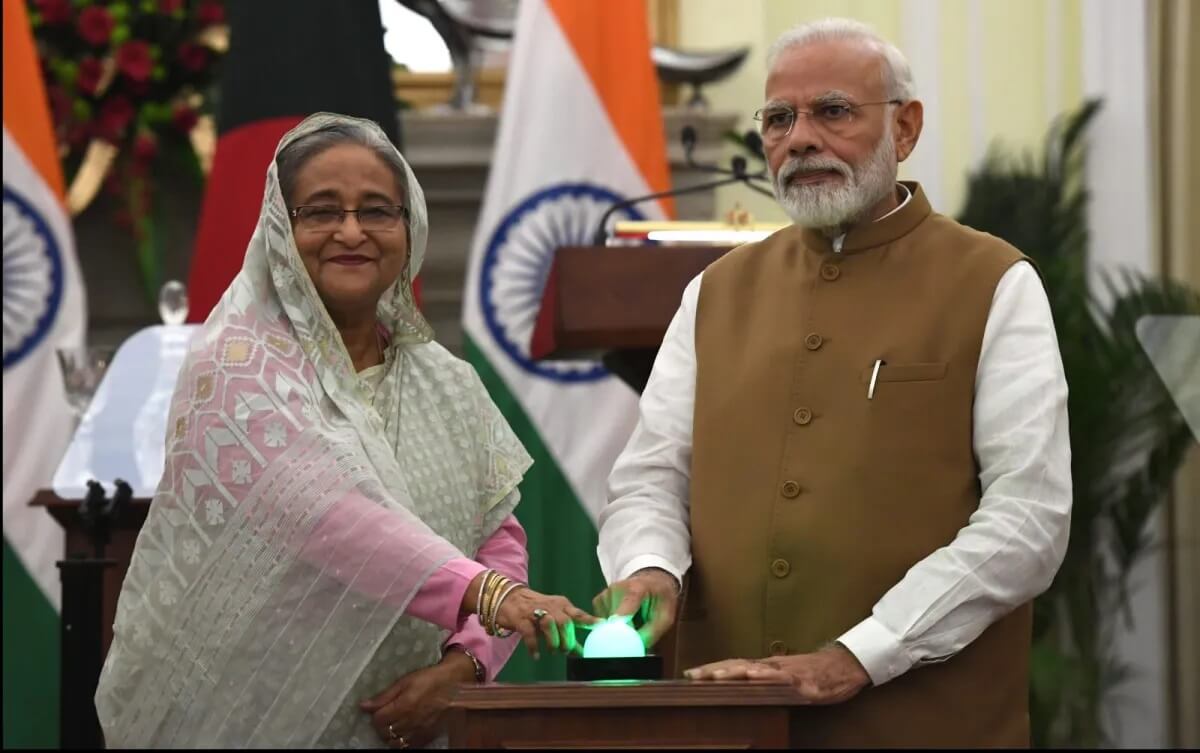More Modi, More Anti-India Sentiment for Bangladesh
Faisal Mahmud | 11 June 2024
Bangladesh leader will attend Modi’s oath-taking ceremony while many of her compatriots will double down on anti-India boycotts
After Indian Prime Minister Narendra Modi’s record-equalling yet subdued election victory, official congratulations came swiftly from neighboring Bangladesh.
Bangladeshi Prime Minister Sheikh Hasina wrote to Modi that he carries the “hopes and aspirations of people of India” and scheduled a visit across the border to attend the Indian leader’s oath-taking ceremony for a third consecutive term on June 7.
However, in her own terrain, Hasina is grappling with the highest level of “anti-India” sentiment among the general populace in recent memory.
Indeed, Hasina has had a hard time assuaging the increasing number of opposing and dissenting voices that propagate the narrative suggesting her prolonged tenure – spanning a record four consecutive terms – owes largely to Modi’s support.
There are considerable compelling reasons underlying such a narrative. Riding on two controversial elections in 2014 and 2019, both marked by opposition boycotts and widespread allegations of vote-rigging, Hasina encountered unprecedented pressure from the United States and the European Union – key importers of the South Asian nation’s multi-billion-dollar apparel products –to ensure a free, fair and inclusive electoral process.
Prior to the January election this year, Western pressure escalated as the US imposed visa restrictions on Bangladeshi individuals perceived to obstruct the voting process, fueling widespread speculation of looming economic sanctions targeting the country’s crucial garment sector.
Garments accounted for nearly 85% of Bangladesh’s total exports in 2023, hitting a record of $47 billion in shipments. The US and EU combined took about 80% of Bangladesh’s apparel sales overseas last year.
However, Indian policymakers reportedly disapproved of Washington’s tough position on Bangladesh, fearing any sanctions on the garment industry would play into China’s hands, destabilize the region and harm India’s security.
A number of media reports suggested that New Delhi facilitated secret negotiations between the US and Bangladesh to avoid sanctions. This was confirmed by Awami League’s General Secretary ObaidulQuader, who praised India for its support during the January 7 election.
Soon after the polls, though, a group of Bangladeshi influencers and activists initiated an “India out” campaign, alleging that the Modi government is supporting Hasina’s continued rule to further its own interests while overlooking the Bangladeshi opposition’s democratic complaints and grievances.
That “India out” campaign has gained significant traction on Bangladesh social media channels, with reports indicating a growing preference for alternatives to Indian products, both domestically and internationally. The campaign, mirroring a similar boycott movement in the Maldives, has also drawn the attention of New Delhi, prompting official statements on the issue.
The boycott, aimed at exerting economic pressure on New Delhi’s significant exports to Bangladesh, currently exceeding $12 billion per year, is part of a broad effort to reduce Dhaka’s dependence on its giant neighbor.
There is no denying the fact that India has historically been unpopular in Bangladesh, even during the Liberation War of 1971 where India played a crucial role in achieving Bangladesh statehood.
This can largely be attributed to religious differences, which were the primary catalyst for carving out Pakistan from the Indian subcontinent.
Traditionally, support for India in Dhaka was primarily confined to the Hindu minority and a segment of Awami League supporters, mainly from the elite class.
Since her first term in 1996, Awami League’s Hasina has cultivated strong bonds with India and has consistently defended Dhaka’s close alliance with Delhi, emphasizing its contribution towards the country’s liberation.
At the same time, India is apprehensive that a return to power of the main opposition Bangladesh Nationalist Party (BNP), which last came to power with ultra-right wing Jamaat-e-Islami coalition, could lead to a resurgence of Islamist influence in Bangladesh, reminiscent of their previous tenure from 2001 to 2006.
But Modi’s continued regime adds a different dimension to the “anti-Indian” sentiment in Bangladesh. The Hindutva ideology promoted by Modi’s regime has marginalized India’s 210 million Muslim minority, which has not gone unnoticed in Muslim-majority Bangladesh.
Furthermore, the implementation of the National Register of Citizen (NRC) and the Citizenship Amendment Act (CAA) under Modi’s regime could potentially displace millions of “unregistered” Muslim citizens from various Indian states, particularly Assam, forcing them to seek refuge in Bangladesh.
This would further strain Bangladesh, a country of 180 million already grappling with the burden of over a million Rohingya refugees from neighboring Myanmar.
A series of border killings, which have escalated over the past decade, the unresolved Teesta River treaty, which has consistently placed Hasina in an embarrassing position domestically, and the unequal trade balance favoring Delhi over Dhaka have all contributed to Bangladeshi ill-will toward India.
A change in power in Delhi that showed Modi the exit wouldn’t necessarily have eased anti-India sentiment in Bangladesh. But when Hasina attends Modi’s oath-taking ceremony on June 7, it will provide more fuel for anti-India boycotts in Bangladesh.
Faisal Mahmud is a Dhaka-based journalist.
This article was originally published on Asia Times.
Views in this article are author’s own and do not necessarily reflect CGS policy.
